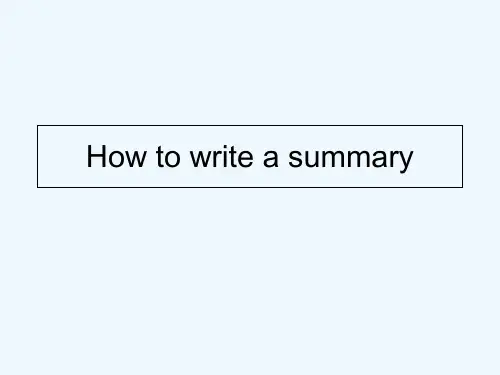最新研究生英语考试文章总结summary writing如何写
- 格式:ppt
- 大小:453.50 KB
- 文档页数:21
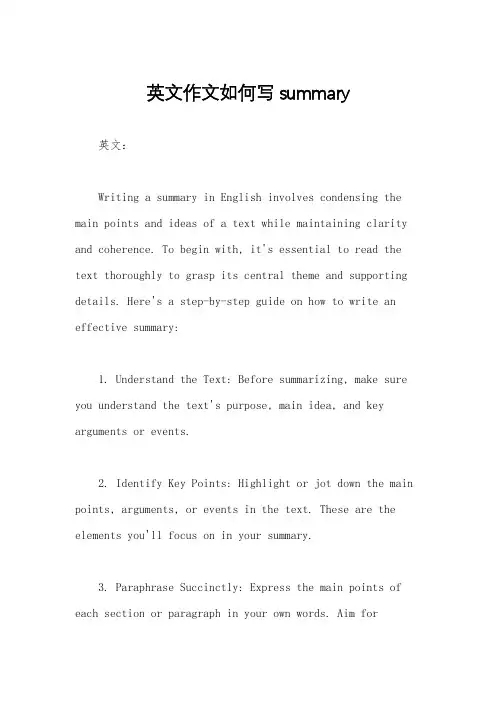
英文作文如何写summary英文:Writing a summary in English involves condensing the main points and ideas of a text while maintaining clarity and coherence. To begin with, it's essential to read the text thoroughly to grasp its central theme and supporting details. Here's a step-by-step guide on how to write an effective summary:1. Understand the Text: Before summarizing, make sure you understand the text's purpose, main idea, and key arguments or events.2. Identify Key Points: Highlight or jot down the main points, arguments, or events in the text. These are the elements you'll focus on in your summary.3. Paraphrase Succinctly: Express the main points of each section or paragraph in your own words. Aim forclarity and brevity, avoiding unnecessary details or examples.4. Maintain Structure: Organize your summary in a logical order, reflecting the structure of the original text. Start with an introduction that briefly describes the text and its context, followed by the main points in sequential order, and end with a concluding statement.5. Avoid Personal Opinions: A summary should be objective and focused solely on the content of the text. Avoid inserting your own opinions or interpretations.6. Check for Accuracy: Ensure that your summary accurately represents the main ideas and arguments of the original text. Double-check any facts or figures to avoid misinterpretation.7. Revise and Edit: Once you've drafted your summary, revise it for clarity, coherence, and conciseness. Remove any redundant or unclear phrases to streamline the summary.Now, let's proceed to the Chinese version.中文:写英文摘要涉及将一篇文章的主要观点和思想浓缩起来,同时保持清晰和连贯。

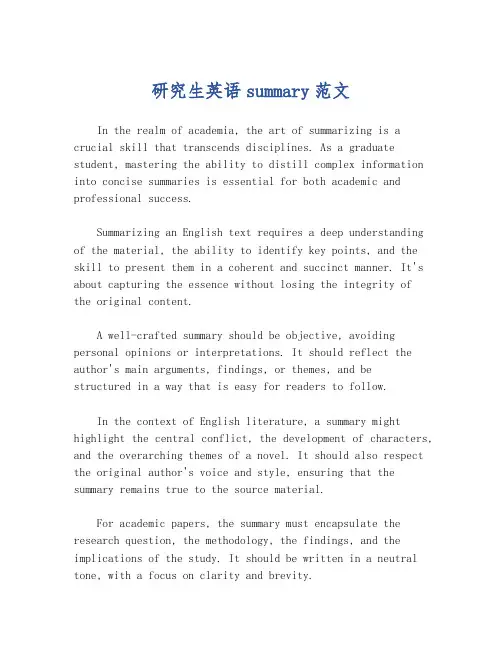
研究生英语summary范文In the realm of academia, the art of summarizing is a crucial skill that transcends disciplines. As a graduate student, mastering the ability to distill complex information into concise summaries is essential for both academic and professional success.Summarizing an English text requires a deep understanding of the material, the ability to identify key points, and the skill to present them in a coherent and succinct manner. It's about capturing the essence without losing the integrity ofthe original content.A well-crafted summary should be objective, avoiding personal opinions or interpretations. It should reflect the author's main arguments, findings, or themes, and bestructured in a way that is easy for readers to follow.In the context of English literature, a summary might highlight the central conflict, the development of characters, and the overarching themes of a novel. It should also respect the original author's voice and style, ensuring that the summary remains true to the source material.For academic papers, the summary must encapsulate the research question, the methodology, the findings, and the implications of the study. It should be written in a neutral tone, with a focus on clarity and brevity.In the business world, a summary of a report or proposal should outline the problem, the proposed solution, and the expected outcomes. It should be persuasive, yet concise, designed to inform and influence decision-makers.The length of a summary can vary, but it's generally shorter than the original text, often by half or even more. The key is to prioritize information, ensuring that every sentence contributes to the overall understanding of the material.Lastly, a good summary is not a substitute for reading the original text. It serves as a tool for quick reference, a way to refresh one's memory, or to provide an overview for those who may not have the time to delve into the full text.In conclusion, the summary is a versatile tool in the graduate student's toolkit. Whether for academic papers, literature reviews, or professional reports, the ability to summarize effectively can enhance one's communication skills and contribute to the clarity of one's academic and professional endeavors.。
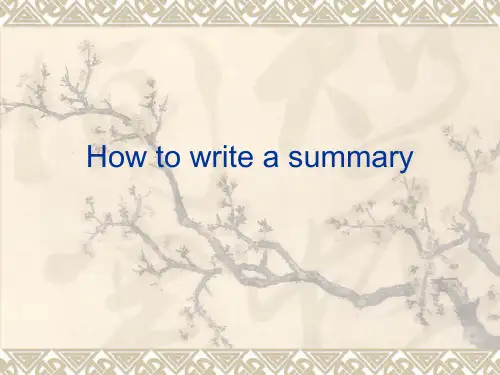
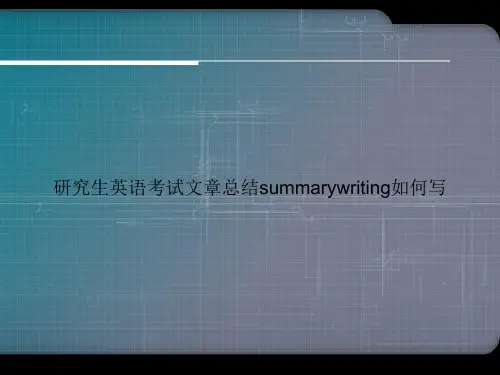
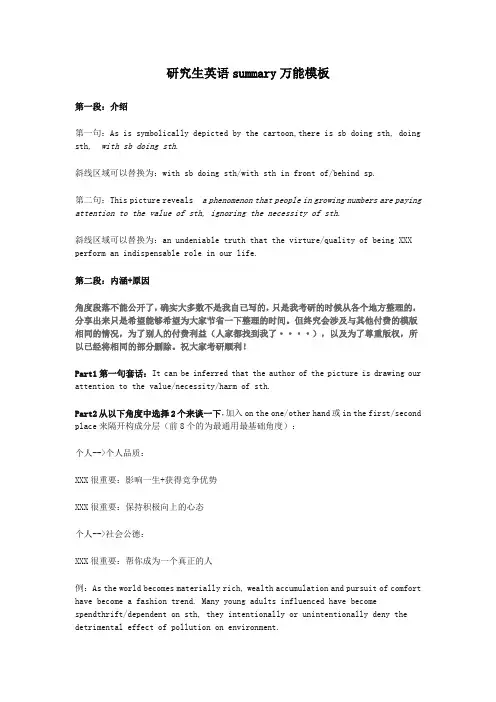
研究生英语summary万能模板第一段:介绍第一句:As is symbolically depicted by the cartoon,there is sb doing sth, doing sth, with sb doing sth.斜线区域可以替换为:with sb doing sth/with sth in front of/behind sp.第二句:This picture reveals a phenomenon that people in growing numbers are paying attention to the value of sth, ignoring the necessity of sth.斜线区域可以替换为:an undeniable truth that the virture/quality of being XXX perform an indispensable role in our life.第二段:内涵+原因角度段落不能公开了,确实大多数不是我自己写的,只是我考研的时候从各个地方整理的,分享出来只是希望能够希望为大家节省一下整理的时间。
但终究会涉及与其他付费的模版相同的情况,为了别人的付费利益(人家都找到我了····),以及为了尊重版权,所以已经将相同的部分删除。
祝大家考研顺利!Part1第一句套话:It can be inferred that the author of the picture is drawing our attention to the value/necessity/harm of sth.Part2从以下角度中选择2个来谈一下,加入on the one/other hand或in the first/second place来隔开构成分层(前8个的为最通用最基础角度):个人-->个人品质:XXX很重要:影响一生+获得竞争优势XXX很重要:保持积极向上的心态个人-->社会公德:XXX很重要:帮你成为一个真正的人例:As the world becomes materially rich, wealth accumulation and pursuit of comfort have become a fashion trend. Many young adults influenced have become spendthrift/dependent on sth, they intentionally or unintentionally deny the detrimental effect of pollution on environment.XXX很重要:随着物质丰富,人们忽视可XXX的影响第二段补充:如果发现第二段感觉字数不够,可以用以下“套话”嵌入增加字数。
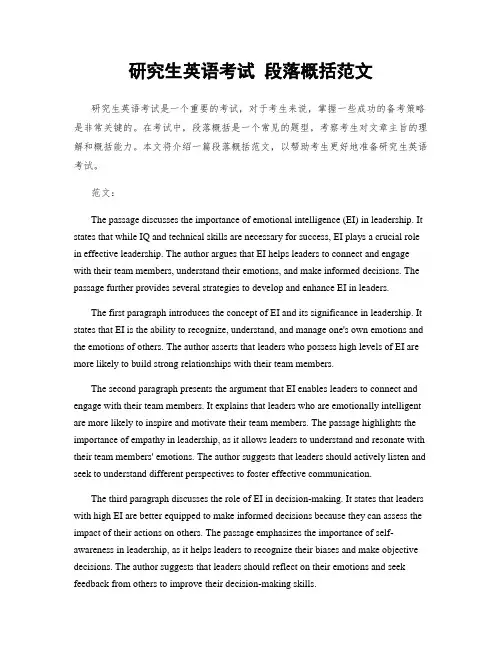
研究生英语考试段落概括范文研究生英语考试是一个重要的考试,对于考生来说,掌握一些成功的备考策略是非常关键的。
在考试中,段落概括是一个常见的题型,考察考生对文章主旨的理解和概括能力。
本文将介绍一篇段落概括范文,以帮助考生更好地准备研究生英语考试。
范文:The passage discusses the importance of emotional intelligence (EI) in leadership. It states that while IQ and technical skills are necessary for success, EI plays a crucial role in effective leadership. The author argues that EI helps leaders to connect and engage with their team members, understand their emotions, and make informed decisions. The passage further provides several strategies to develop and enhance EI in leaders.The first paragraph introduces the concept of EI and its significance in leadership. It states that EI is the ability to recognize, understand, and manage one's own emotions and the emotions of others. The author asserts that leaders who possess high levels of EI are more likely to build strong relationships with their team members.The second paragraph presents the argument that EI enables leaders to connect and engage with their team members. It explains that leaders who are emotionally intelligent are more likely to inspire and motivate their team members. The passage highlights the importance of empathy in leadership, as it allows leaders to understand and resonate with their team members' emotions. The author suggests that leaders should actively listen and seek to understand different perspectives to foster effective communication.The third paragraph discusses the role of EI in decision-making. It states that leaders with high EI are better equipped to make informed decisions because they can assess the impact of their actions on others. The passage emphasizes the importance of self-awareness in leadership, as it helps leaders to recognize their biases and make objective decisions. The author suggests that leaders should reflect on their emotions and seek feedback from others to improve their decision-making skills.The fourth paragraph provides strategies to develop and enhance EI in leaders. It suggests that leaders should focus on self-awareness, self-regulation, motivation, empathy, and social skills. The passage emphasizes the importance of self-reflection and self-evaluation to identify areas for improvement. The author also encourages leaders to seek feedback and support from mentors or coaches to accelerate their development.In conclusion, the passage highlights the significance of emotional intelligence in leadership and provides strategies to develop and enhance EI. It asserts that leaders with high levels of EI are more likely to connect with their team members, understand their emotions, and make informed decisions. The passage serves as a reminder for aspiring leaders to prioritize the development of emotional intelligence in their quest for success.。
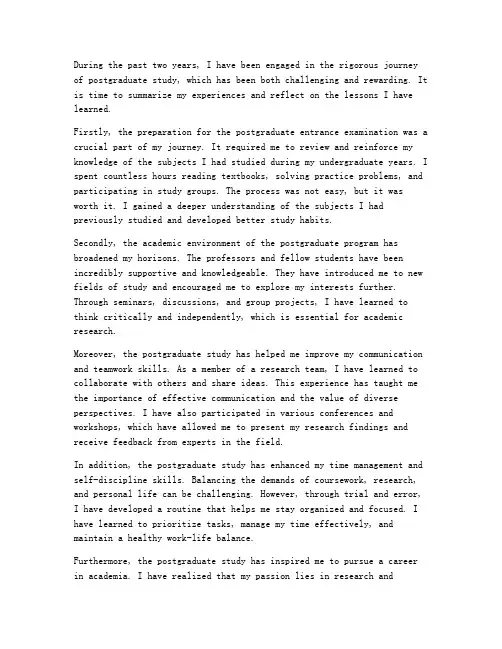
During the past two years, I have been engaged in the rigorous journey of postgraduate study, which has been both challenging and rewarding. It is time to summarize my experiences and reflect on the lessons I have learned.Firstly, the preparation for the postgraduate entrance examination was a crucial part of my journey. It required me to review and reinforce my knowledge of the subjects I had studied during my undergraduate years. I spent countless hours reading textbooks, solving practice problems, and participating in study groups. The process was not easy, but it was worth it. I gained a deeper understanding of the subjects I had previously studied and developed better study habits.Secondly, the academic environment of the postgraduate program has broadened my horizons. The professors and fellow students have been incredibly supportive and knowledgeable. They have introduced me to new fields of study and encouraged me to explore my interests further. Through seminars, discussions, and group projects, I have learned to think critically and independently, which is essential for academic research.Moreover, the postgraduate study has helped me improve my communication and teamwork skills. As a member of a research team, I have learned to collaborate with others and share ideas. This experience has taught me the importance of effective communication and the value of diverse perspectives. I have also participated in various conferences and workshops, which have allowed me to present my research findings and receive feedback from experts in the field.In addition, the postgraduate study has enhanced my time management and self-discipline skills. Balancing the demands of coursework, research, and personal life can be challenging. However, through trial and error, I have developed a routine that helps me stay organized and focused. I have learned to prioritize tasks, manage my time effectively, and maintain a healthy work-life balance.Furthermore, the postgraduate study has inspired me to pursue a careerin academia. I have realized that my passion lies in research andteaching. I am eager to contribute to the advancement of my field and share my knowledge with future generations. To achieve this goal, I am actively seeking opportunities to publish my research and participate in international conferences.In conclusion, the postgraduate study experience has been transformative. It has equipped me with the knowledge, skills, and confidence to pursue my academic and professional goals. I am grateful for the opportunities and challenges I have encountered during this journey. As I look forward to the future, I am determined to continue learning, growing, and contributing to the field of study that I am passionate about.In the next few years, I will strive to publish my research, collaborate with experts in the field, and ultimately, achieve my dream of becoming a professor. I am confident that the skills and knowledge I have gained during my postgraduate study will help me achieve these goals. Thank you for the support and guidance I have received throughout this journey.。
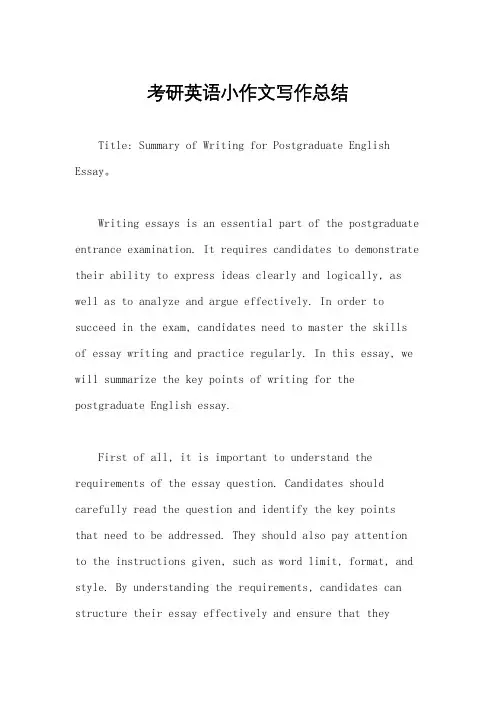
考研英语小作文写作总结Title: Summary of Writing for Postgraduate English Essay。
Writing essays is an essential part of the postgraduate entrance examination. It requires candidates to demonstrate their ability to express ideas clearly and logically, as well as to analyze and argue effectively. In order to succeed in the exam, candidates need to master the skills of essay writing and practice regularly. In this essay, we will summarize the key points of writing for the postgraduate English essay.First of all, it is important to understand the requirements of the essay question. Candidates should carefully read the question and identify the key pointsthat need to be addressed. They should also pay attention to the instructions given, such as word limit, format, and style. By understanding the requirements, candidates can structure their essay effectively and ensure that theyanswer the question comprehensively.Secondly, candidates should organize their ideas logically. A well-structured essay should have a clear introduction, body, and conclusion. In the introduction, candidates should provide background information and state their thesis statement. In the body, they should present their arguments and evidence to support their thesis. Inthe conclusion, they should summarize their main points and restate their thesis. By organizing their ideas in this way, candidates can make their essay coherent and easy to follow.Thirdly, candidates should use appropriate language and style. They should avoid using jargon or complex vocabulary that may confuse the reader. Instead, they should use clear and concise language to convey their ideas effectively.They should also use appropriate grammar and punctuation to ensure that their essay is well-written and easy to read.By using the right language and style, candidates can makea good impression on the examiners and score high marks.In addition, candidates should practice writing essaysregularly. Writing is a skill that improves with practice, so candidates should set aside time to write essays on a regular basis. They can also seek feedback from teachers or peers to help them improve their writing skills. By practicing regularly, candidates can become more confident in their writing abilities and perform better in the exam.In conclusion, writing essays for the postgraduate English exam requires candidates to demonstrate theirability to express ideas clearly and logically. By understanding the requirements of the question, organizing their ideas effectively, using appropriate language and style, and practicing regularly, candidates can improve their writing skills and succeed in the exam. With determination and hard work, candidates can achieve their goal of entering a postgraduate program.。
